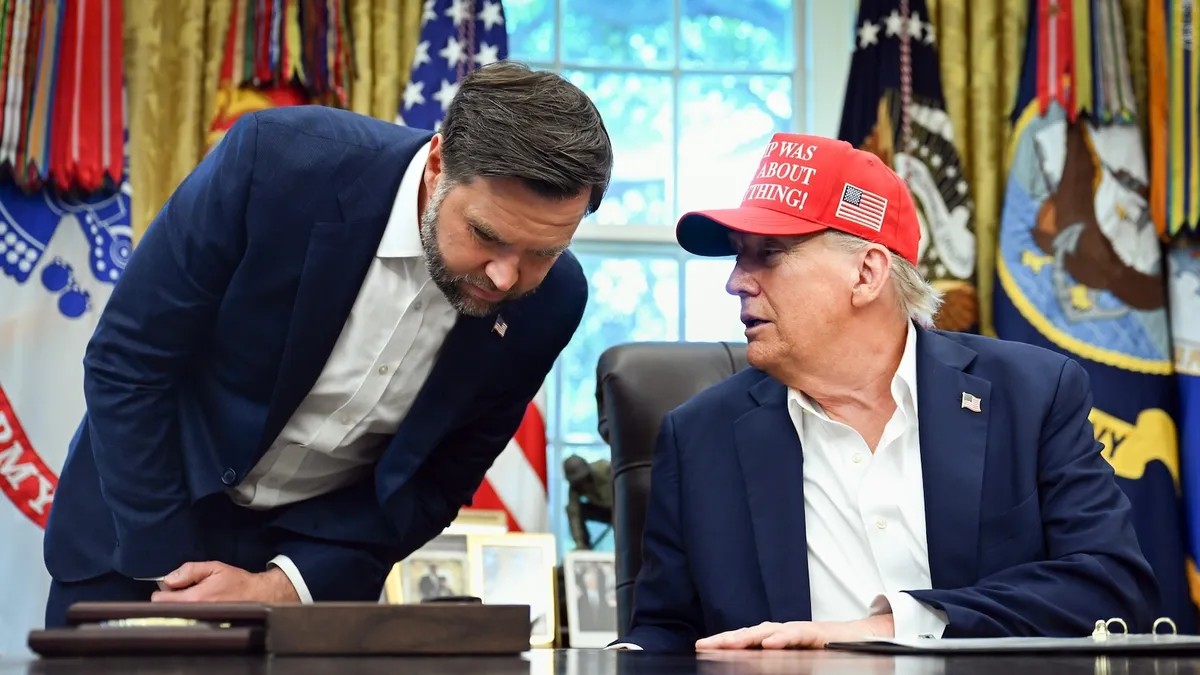
On Sunday, Vice President JD Vance shared significant insights regarding Russia's recent concessions in negotiations aimed at ending the ongoing war with Ukraine. In an interview on NBC's Meet the Press, Vance was questioned about the possibility of Russia merely stringing along former President Donald Trump, to which he firmly responded that this is not the case. According to Vance, Russia has demonstrated a newfound flexibility in its demands, marking a pivotal moment in the 3.5-year-long conflict.
Vance emphasized that for the first time in years, Russia has shown a willingness to negotiate on some of its core demands. He stated, "I think the Russians have made significant concessions to President Trump... They've actually been willing to be flexible on some of their core demands." While acknowledging that the conflict is far from over, he expressed optimism about the ongoing diplomatic efforts and the potential for progress. "We sometimes feel like we've made great progress with the Russians, and sometimes... the president has been very frustrated with the Russians," he added.
When pressed about why Russia might pursue peace, especially after rejecting Trump's ceasefire proposal and the absence of a scheduled meeting between Russian President Vladimir Putin and Ukrainian President Volodymyr Zelenskyy, Vance clarified, "What they have conceded is the recognition that Ukraine will have territorial integrity after the war." This marks a departure from Russia's earlier demands, which included the installation of a puppet regime in Kyiv. Vance highlighted that Russia now acknowledges the need for security guarantees concerning Ukraine's territorial integrity.
During the interview, Vice President Vance mentioned that while additional sanctions against Russia remain a possibility, any such actions would be evaluated on a case-by-case basis. "No, sanctions aren't off the table. But we're going to make these determinations on a case-by-case basis," he noted, stressing the need for effective leverage to bring Russia to the negotiating table.
In a separate segment aired on Meet the Press, Russian Foreign Minister Sergey Lavrov responded to accusations that Russia is manipulating Trump. Lavrov stated, "We respect President Trump because he defends American national interests." He pointed out that it is European leaders who are currently obstructing a peace agreement, emphasizing that both Trump and Putin desire peace in Ukraine.
Lavrov further noted that there is currently no scheduled meeting between Putin and Zelenskyy, attributing this to the lack of a clear agenda. Zelenskyy echoed this sentiment, asserting that Russia's unwillingness to end the war is the primary issue at hand. "The issue is that they don't want to end the war," he stated, highlighting the necessity of reducing the space for continued conflict.
U.S. and European defense officials have been engaged in discussions regarding security assurances for Ukraine to deter further Russian aggression. NATO Secretary-General Mark Rutte was recently in Ukraine to outline a framework for these security guarantees. He emphasized that the first priority is to strengthen Ukrainian armed forces, which would serve as a foundational element after a potential peace deal or long-term ceasefire.
Vice President Vance reiterated Trump's stance that there will be no U.S. troops deployed on Ukrainian soil as part of these security guarantees. "The president's been very clear. There are not going to be boots on the ground in Ukraine," he asserted, underscoring the U.S. commitment to providing support without direct military involvement.
In response to comments made by Putin about the unity of the Russian and Ukrainian people, Lavrov asserted that Ukraine has the right to exist, but with conditions. He suggested that the Ukrainian government must allow for the integration of those they label as 'terrorists' into the Russian cultural sphere. This reflects the ongoing complexities surrounding the conflict, especially regarding territorial integrity and national identity.
As the situation evolves, both U.S. officials and international leaders continue to navigate the intricacies of diplomacy, aiming for a peaceful resolution to the conflict in Ukraine while balancing geopolitical interests.